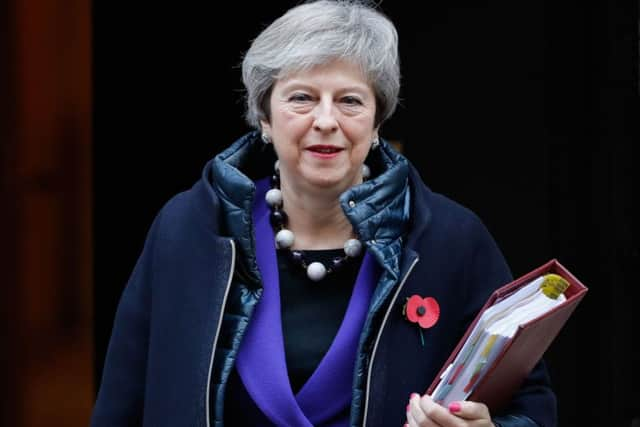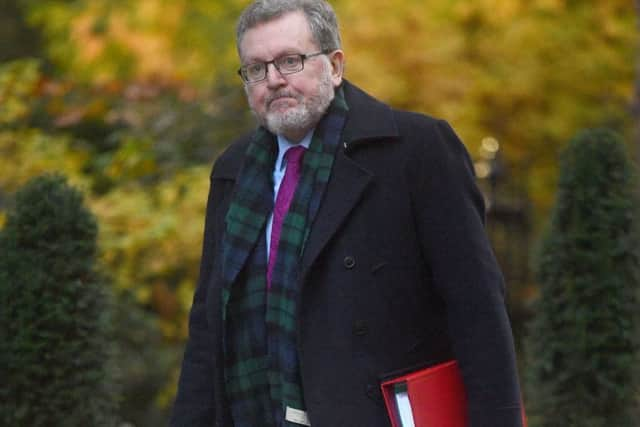Brian Monteith: Will Scottish Tories be filleted by voters for backing Theresa May?
There can be little doubt that the Prime Minister’s Draft Withdrawal Agreement and its accompanying Political Declaration is going to struggle to gain the approval of parliament.
If only she had shown such chutzpah and doggedness when negotiating with those EU leaders as she has in fielding questions during statements and interviews she might not be in the precarious position she is now.


Advertisement
Hide AdAdvertisement
Hide AdTragically, she has surrendered so many compromises, so many concessions, that practically everyone is against her proposals. Two genuine problems stare MPs in the face – the first is that if they read the 500+ pages of the Draft Withdrawal Agreement and the seven-page Draft Political Declaration they will see the Prime Minister’s soundbites are torpedoed by the detail.
Her claims the UK will leave the Single Market, the Customs Union and ECJ jurisdiction are simply not true. For while some of the arrangements that replicate the UK’s current subservience or membership to these institutions are indeed time limited they are underpinned by the fact that if the supposed Irish border problem is not resolved to the EU’s satisfaction by the end of 2020 then the backstop kicks in that keeps the UK locked into those same arrangements in perpetuity.
Given there is no incentive for the EU to come to an agreement when the backstop would be preferable to having a deal, because it gives EU members who will write our laws unfettered access to UK markets and prevents the UK from establishing the free trade agreements that could see its economy pull away from the low-growth EU, then it is difficult not to conclude we would be trapped. Yet on and on the Prime Minister goes, stating in robotic fashion that we will have control of our money, our laws and our borders when nothing could be further from the truth.


This brings us to the second problem – trust. Or lack of it. The Prime Minister is not only leaving herself open to the charge of being a serial liar about what her proposals mean, she has also demonstrated a level of duplicity not seen since the Molotov-Ribbentrop Pact between Nazi Germany and Communist Russia.
She has worked in league with civil servants to undermine both Cabinet ministers David Davis and Liam Fox who had directed plans be drawn up to leave the Customs Union and Single Market and formulate a Canada-style trade agreement. The result was her Chequers plan sprung on the Cabinet with the ridiculous threat there would be no transport provided if anyone resigned.
We can now see that the same behind-the-scenes trickery was played out on Dominic Raab, the second DExEU Secretary of State, who had to be briefed by the Prime Minister as she had let lead civil servant Olly Robbins go far, far further than Raab had countenanced.
So, we have a Prime Minister who is either in utter denial about what her proposals mean and will lead to, or has become the greatest charlatan of our age simply to get her way..
With the parliament’s approval now the key battlefield – not withstanding the likelihood of a Conservative backbench move to no-confidence the Prime Minister that could make it all academic – every vote counts.
Advertisement
Hide AdAdvertisement
Hide AdLabour may yet find a way to back the Prime Minister by allowing enough of its number to “rebel” against the whip to see that May wins – if only because relying on Labour support will screw up the Tory party so much it will break into civil war. The hope would be that the government would implode, making a general election necessary.
More likely is that in its drive to collapse the government Labour shall choose to help defeat the Prime Minister’s flagship policy – which in the past would also mean a general election.
Both scenarios face a problem. The Fixed-Term Parliaments Act of 2011 requires two-thirds of MPs to vote in favour of calling a general election outside a term of five years – and Conservative MPs are more likely to try to change leader through a no-confidence vote or forcing a resignation than become proverbial turkeys voting for a Christmas as the main course.
The DUP MPs are now scunnered with the duplicity of Theresa May and shall not vote for her proposals. This puts the 13 Scottish Conservatives in a very strong position – but with this strength also comes a public scrutiny and a realisation that if they make the wrong decision they will bring the wrath of the Scottish people down upon them.
Nine of the 13 Tory MPs have coastlines where fishing is of interest – in many, such as Moray or Banff & Buchan it is the key issue that could determine the difference between winning and losing in an election and last week all 13 wrote to the Prime Minister appealing for us to leave the CFP and ensure we decide who fishes in our waters, when they fish and what they fish.
Anything less is unacceptable.
Theresa May talks about the UK becoming an independent coastal state for the first time in 40 years. It all seems convincing and in keeping with manifesto commitments and campaign pledges made during the 2017 general election and the 2016 EU referendum. What could be wrong with that? Well, if her wording is studied carefully it can be seen there’s nothing to prevent a UK government replicating the existing arrangements and maintaining the present advantageous share that goes to other EU nations.
They have to ask themselves, with a Prime Minister who works behind the scenes to sell her own Ministers out, how can they trust her not to sell our fishermen out too?
More broadly, the wider body of Conservative MPs have to ask, why should they put their faith in a Prime Minister who is now self-delusional to take forward the next stage of negotiations when she has so abjectly failed to achieve anything except surrender in the first stage?
